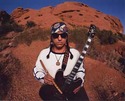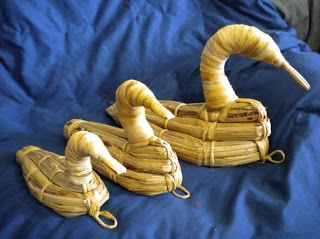 |
| Watch videos below |
| Add caption |
ACLU says Bisbee activist has the right to video tape, and post the video online, when Border Patrol agents come trampling through her property
By Brenda Norrell
Censored News
BISBEE, Ariz. -- Border Patrol agents have pressured YouTube into censoring a video of agents making an arrest in Bisbee, Arizona. The video includes the image of a migrant with a bloody nose. Meanwhile, the ACLU has contacted YouTube stating that a Bisbee resident has the right to post this video.
The Arizona ACLU argues in its letter to both YouTube and Customs and Border Patrol "that public officials have no reasonable expectation of privacy while exercising their official duties in public places."
Stephen Lemon, in his column Feathered Bastard at Phoenix New Times, tries to track down the reasons that Border Patrol doesn't want the video posted. Lemon writes that Activist Alison McLeod "lives on her own property, which is regularly invaded by BP agents hot on the trail of her footprints. (I kid you not.)"
http://blogs.phoenixnewtimes.com/bastard/2011/09/border_patrol_youtube_censor_v.php
http://blogs.phoenixnewtimes.com/bastard/2011/09/border_patrol_youtube_censor_v.php
For everyone that has been harassed, detained, assaulted or threatened by Border Patrol agents, including news reporters on the border, it is good to see the exposure of both the censorship by YouTube and the Border Patrol's efforts to hide.
Today's story follows last week's release of "A Culture of Cruelty," by the humanitarian aid organization No More Deaths in Tucson, documenting years of abuse, where children and adults were beaten by Border Patrol agents, and migrants were denied water, food and medicine.
At the same time, Border Patrol agents in the Southwest continue to be arrested for drug smuggling and corruption. Yuma Border Patrol agent Michael Angelo Atondo, already suspended after being charged with smuggling 745 pounds of marijuana, was arrested again on Thursday for drug charges.
In June, Customs and Border Patrol officials testified before a Congressional committee, revealing that since Oct., 2004, 127 CBP personnel have been arrested, charged or convicted of corruption. Of the 127 arrests, 95 are considered mission compromising acts of corruption. At the time of the hearing in June, there were 267 corruption related investigations underway of the Border Patrol.
Meanwhile, Alison has made a properly censored video and posted it on YouTube. See both videos below.
Here's her note on YouTube: "BANNED FROM YOUTUBE. Was it the dogs and chickens? The plainclothes agents with the latex gloves? Or was it the young detainee with the bloody nose? This video contains a remake of a benign video that was removed from YouTube at the request of Border Patrol. The original video was intended to show that life on the U.S.-Mexican border is not the 'war zone' as is portrayed in the corporate media. First Amendment protections were designed to keep the government and its officers from abusing absolute power. However, the new video is now properly censored and annotated, with a left-wing liberal bias."
Today's story follows last week's release of "A Culture of Cruelty," by the humanitarian aid organization No More Deaths in Tucson, documenting years of abuse, where children and adults were beaten by Border Patrol agents, and migrants were denied water, food and medicine.
At the same time, Border Patrol agents in the Southwest continue to be arrested for drug smuggling and corruption. Yuma Border Patrol agent Michael Angelo Atondo, already suspended after being charged with smuggling 745 pounds of marijuana, was arrested again on Thursday for drug charges.
In June, Customs and Border Patrol officials testified before a Congressional committee, revealing that since Oct., 2004, 127 CBP personnel have been arrested, charged or convicted of corruption. Of the 127 arrests, 95 are considered mission compromising acts of corruption. At the time of the hearing in June, there were 267 corruption related investigations underway of the Border Patrol.
Meanwhile, Alison has made a properly censored video and posted it on YouTube. See both videos below.
Here's her note on YouTube: "BANNED FROM YOUTUBE. Was it the dogs and chickens? The plainclothes agents with the latex gloves? Or was it the young detainee with the bloody nose? This video contains a remake of a benign video that was removed from YouTube at the request of Border Patrol. The original video was intended to show that life on the U.S.-Mexican border is not the 'war zone' as is portrayed in the corporate media. First Amendment protections were designed to keep the government and its officers from abusing absolute power. However, the new video is now properly censored and annotated, with a left-wing liberal bias."
Here's the ACLU's statement and the video:
ACLU Says Bisbee Activist Has First Amendment Right to Post Border Patrol Video on YouTube
Thursday, September 29, 2011 CONTACT: Alessandra Soler Meetze, ACLU of Arizona, (602) 773-6006 (office) or 602-301-3705
PHOENIX – In letter sent today to YouTube administrators, the American Civil Liberties Union of Arizona criticized the online company for censoring a video of United States Customs and Border Protection (CBP) agents arresting a man with a bloody nose.
The 5-minute video, dubbed “Border Patrol in the Bushes,” was taken by Bisbee activist Alison McLeod, who pulled out her video camera and started filming border patrol arresting an individual after she heard helicopters and saw several agents, on horseback and on foot, on her property on August 31st. The video shows four CBP agents walking an individual in handcuffs through her property to a white CBP truck parked on a public road. McLeod posted it on YouTube on September 2nd where it received “hundreds” of views within hours. Ten days after the video was posted, YouTube officials took it down, citing privacy complaints by CBP agents.
“This is yet another example of a private online community trampling on our First Amendment rights and trying to exercise greater control over what we share and watch online,” said Alessandra Soler Meetze, executive director of the American Civil Liberties Union of Arizona. “People have the right to film government officials carrying out their duties in public places. By censoring this type of protected speech, YouTube officials not only violated their own guidelines, but they’ve managed to silence debate around U.S. immigration practices along the U.S.-Mexico border.”
According to YouTube, three complaints about the video were filed; two of them were posted by CBP agents. Within hours of the YouTube posting, a CBP supervisor showed up unannounced at McLeod’s doorstep, telling her 19-year-old daughter who was home at the time that he was inquiring about the YouTube video. The agent then offered to give McLeod and her daughter a tour of the Border Patrol facilities and the local search area.
“This is the reality of border enforcement for those of us living on the border,” said McLeod, who has been living on the border since 1997. “Rather than trying to intimidate residents like me who are simply trying to make CBP more accountable to the public, they should respect the rights of all people living on the border.”
The ACLU sent a separate letter to the CBP’s Tucson Field Office, arguing their involvement in trying to remove the video constitutes “severe government interference with McLeod’s constitutional rights.”
“Customs and Border Protection is now the nation's largest federal law enforcement agency and it operates with total impunity, accountable to no one and with little government oversight,” added Meetze. “This video and CBP’s response to it underscores the need for greater transparency.”
Although YouTube has privacy guidelines that allow them to remove content where an individual is “uniquely identifiable,” the ACLU argues in its letter to both YouTube and CBP that public officials have no reasonable expectation of privacy while exercising their official duties in public places. The ACLU letter also points out that “nothing distinguishes McLeod’s videos from the hundreds of videos already on YouTube demonstrating various law enforcement activities.”
“YouTube boasts that it is the biggest news platform in the world,” wrote ACLU of Arizona Legal Director Dan Pochoda in his three-page letter to YouTube. “One of the goals of a free press is to hold government officials accountable for their actions. Granting law enforcement a de facto veto over materials they find objectionable or unflattering would violate and jeopardize that mission.”
The letter to YouTube asks the company to allow McLeod to repost her video and any future videos of government officials performing their duties. The ACLU also is asking CBP to stop interfering with McLeod’s efforts to videotape and photograph CBP activities on her own property or public land, and to rescind its complaints seeking the removal of the video from YouTube.
The Censored Video:
The properly censored video now on YouTube:




























